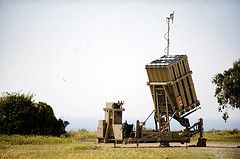
Everything you need to know about today’s media coverage of Israel and the Mideast.
Is Big Media underplaying the Hamas-Fatah split? What dirty laundry is Yasser Arafat’s wanted moneyman hinting he’ll expose? Doesn’t Bashar Assad realize he lost the info war months ago?
Join the Israel Daily News Stream on Facebook.
Israel and the Palestinians
• The Hamas-Fatah split is more profound than people believe, and Jonathan Spyer says this is a story inadequately covered by Big Media.
The nature of the regime created by Hamas in Gaza, and its strength and durability, has received insufficient attention in the West. This may have a political root: Western governments feel the need to keep alive the fiction of the long-dead peace process between Israelis and Palestinians. One of the necessary components of this is pretending that the historic split between nationalists and Islamists among the Palestinians has not really happened, or that it is a temporary glitch that will soon be reconciled. This fiction is necessary for peace process believers, because it enables them to continue to treat the West Bank Palestinian Authority of Mahmoud Abbas as the sole representative of the Palestinians.
But fiction it is. An Islamist one-party quasi-state has been built in Gaza over the last half-decade.
 • The Washington Post‘s Walter Pincus thinks the US is putting Israeli budgetary concerns ahead of its own in the area of defense spending. Pincus targets a $680 million deal to help Israel pay for and procure additional Iron Dome batteries. Last I saw of this, Congress was indeed playing hardball for some rights to the defense system.
• The Washington Post‘s Walter Pincus thinks the US is putting Israeli budgetary concerns ahead of its own in the area of defense spending. Pincus targets a $680 million deal to help Israel pay for and procure additional Iron Dome batteries. Last I saw of this, Congress was indeed playing hardball for some rights to the defense system.
• Mahmoud Abbas swore in a new PA cabinet. Salam Fayyad remains Prime Minister, but he had to relinquish the finance portfolio. The BBC writes:
The new finance minister is Nabil Kassis, a former university president and independent. He will have to cope with a projected $500m gap in the Palestinian Authority’s $1.3bn budget, most of which comes from the European Union, United States and Arab countries.
• Open Zion‘s Emily Hauser thinks she has proof that Gaza is still occupied by Israel. But Hamas honcho Mohammed Zahar bursts Hauser’s balloon. He’s going to travel unhindered to Egypt in order to vote in the upcoming elections.
• Writing in Foreign Policy, Aaron David Miller disagrees with Ambassador Michael Oren’s recent Wall Street Journal commentary on Israel’s image.
But I just don’t buy the argument that Israel’s image has eroded principally because of a dedicated campaign to delegitimize it.
Three other factors drive Israel’s very bad PR: the realities of nation-building, the image of the asymmetry of power, and Israel’s own actions, which, like those of so many other countries, value short-term tactics over long-term strategy . . .
The notion that Israel’s unfavorable image is a result of some evil cabal that plots daily against it infantilizes the Israelis and takes them out of history as real-world actors who sometimes do well in pursuit of their interests and at other times screw up badly. Israel is a remarkable state that has sought to preserve its moral and ethical soul in a cruel and unforgiving world. But it is still only a nation of mortals trying to survive in that world.
• AP‘s Karin Laub expands on the the PA’s corruption case against Yasser Arafat’s financial advisor, Mohammed Rashid. The story’s getting juicy:
In comments posted Tuesday on the website Inlightpress, Rashid said he would not respond to the allegations now, but warned that Abbas “made a huge mistake and must suffer the consequences.” He did not elaborate. The website, which is believed to be linked to Rashid, announced in a separate section that it would soon run a series of articles by Rashid about the circumstances of Abbas’ rise to power.
• Meet Boualem Sansal, an Algerian novelist shrugging off critics to attend the International Writers Festival in Jerusalem. He shared his jaundiced view of the Mideast conflict and Arab Spring with the Jerusalem Post:
On Wednesday, Sansal, a staunch secularist, reiterated his warnings about the rising tide of Islamism in the wake of the Arab revolts.
“I feel we’re in the 1930s in the last century – then, no one responded properly. Today Islamism is becoming fascism,” he said. “If there’s no democracy, people will look for religion to be their parliament, their government and so forth. There’s a lot of work to be done.”
“Let’s not delude ourselves that this will take 10 or 15 years – this will be very difficult work,” he added.

